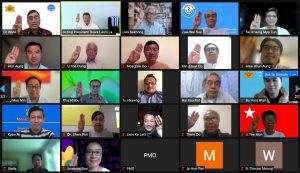Myanmar’s military junta has revoked the citizenship of a number of prominent opposition figures, including senior members of the National Unity Government (NUG) that is spearheading the resistance to the coup administration.
According to a notice published in the stentorian state mouthpiece, the Global New Light of Myanmar, the junta “terminated” the citizenship of 11 individuals prominent in the struggle against last February’s coup. These include the NUG’s spokesperson Dr. Sasa, who has developed a prominent profile as the international face of the resistance movement, and three members of its shadow cabinet: Foreign Minister Zin Mar Aung, Human Rights Minister Aung Myo Min, and Home Minister Lwin Ko Latt.
The notice said the group had “violated the existing laws of the State and left the country illegally were found to be committing acts that could harm the interests of Myanmar.” The prominent pro-democracy activists Min Ko Naing and Ei Thinzar Maung and the writer Ei Pencilo also had their citizenship revoked, the notice said, adding that “similar perpetrators will be identified and prosecuted.” (Some of the named individuals are believed to still be in hiding in Myanmar.)
The NUG was established last April in order to coordinate the nationwide resistance to the military’s reassertion of power and to compete with the military junta for international recognition. It is filled mostly with members of the ousted National League for Democracy (NLD) administration and their allies in civil society and ethnic minority organizations. A few months after the NUG’s founding, the military government official designated it a “terrorist organization,” along with its armed wing, the People’s Defense Force.
For the Myanmar military, stripping dissidents of their citizenship is a time-tested tactic for isolating and proscribing its opponents. In the years after the bloody repression of pro-democracy protests in 1988, thousands of dissenters and exiles were effectively rendered stateless by military diktat, complicating their ability to travel abroad and rally international support for their cause.
In December, the military junta revoked the passports of almost 70 opposition figures and members of the ousted government including NUG Foreign Affairs Minister Zin Mar Aung and leading NLD lawmaker Aung Kyi Nyunt. As the ABC reported at the time, Myanmar’s embassy in Canberra sent the list of names to Australia’s Department of Foreign Affairs and Trade and a number of foreign missions, with a request that they “consider the above mentioned passports as cancelled” and not to recognize them.
The move is further evidence that the junta has placed much of the NUG’s cabinet and senior leadership beyond the political pale, with implications for efforts by the Association of Southeast Asian Nations (ASEAN) to broker a resolution to Myanmar’s prolonged political emergency. Cambodian Foreign Minister Prak Sokhonn is scheduled to visit Myanmar later this month on his first mission as ASEAN special envoy, and has previously expressed his desire to meet with members of the anti-coup opposition, in line with ASEAN’s Five-Point Consensus peace plan.
Unfortunately, this latest move suggests that the junta is seeking to rule out of bounds in advance the members of the opposition that are most representative of its goals, and most likely to foster a meaningful dialogue. This highlights what many have suspected since the coup: namely, that the military has no intention of compromising with groups it views as enemies. Where that leaves ASEAN’s efforts remains to be seen, but presents a significant obstacle to the implementation of the Five-Point Consensus.

































